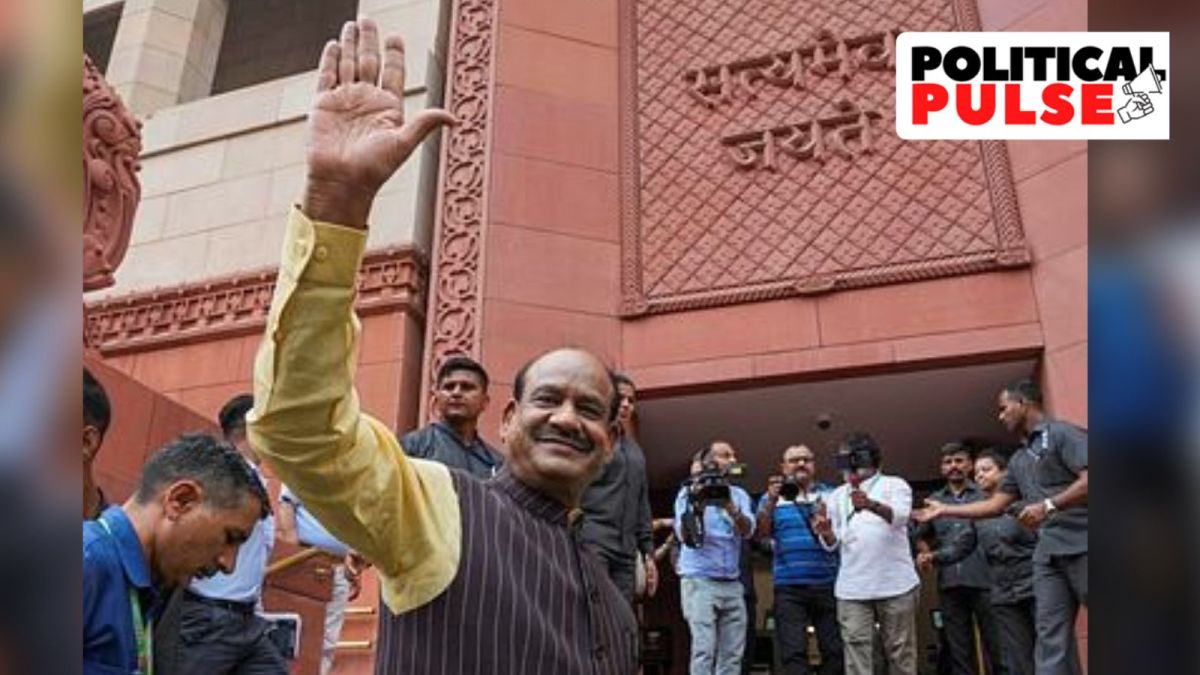Om Birla’s second innings as Lok Sabha Speaker: Grassroots leader who rose through BJP ranks
In his first stint, Birla had a mixed track record. With composition of new Lok Sabha having changed significantly, Opp hopes this would also reflect in his approach in conducting the House now

The ruling BJP-led NDA’s nominee Om Birla has been elected as the Speaker of the 18th Lok Sabha on Wednesday by a voice vote as the House saw a rare contest for the crucial post. The three-term BJP MP from Rajasthan’s Kota, Birla was also the Speaker of the previous House.
The Lok Sabha witnessed a contest between Birla and the INDIA bloc’s nominee Kodikunnil Suresh, the eight-time Congress MP from Kerala’s Mavelikara, after the Narendra Modi-led NDA government and the Opposition alliance failed to reach a consensus. With the numbers on the NDA’s side, Birla was expected to sail through smoothly.
On Wednesday morning, PM Modi moved the motion in the House to elect Birla as the new Speaker. The motion in favour of Suresh’s bid was moved by Shiv Sena (UBT) MP Arvind Sawant. Birla won by a voice vote.
Following his election, Birla was congratulated by PM Modi and Congress leader Rahul Gandhi, both of whom escorted him to the Speaker’s chair. The PM said Birla’s experience of being a Speaker in the 17th Lok Sabha would help him guide the country further.
In the previous House, when the BJP had absolute majority on its own, Birla was elected as the Speaker unopposed on June 19, 2019. PM Modi had picked him for the post.
In his first five-year stint as the Speaker, Birla had a mixed track record. He led a House that had a brute majority of the NDA. So during this tenure, the Lok Sabha saw the highest number of suspensions of the Opposition MPs in a single session ever, with 100 MPs being suspended from the House between December 14 and 21, 2023.
Birla is however also said to have made attempts to “accommodate” the voices of the Opposition members by giving opportunity to many of their MPs to speak on a wide range of issues. He would occasionally adopt a strict approach towards the Treasury benches, including even ministers, while asking them to respond to the questions raised by the Opposition leaders. He would also encourage all the first-time MPs to speak out on their concerns.
Before being elected to the Lok Sabha for the first time from Kota in 2014, Birla was elected to the Rajasthan Assembly thrice. It had been a long wait for Birla, who cut his teeth as a politician in the Bharatiya Janata Yuva Morcha, the BJP’s youth wing. He first had to wait for a chance to get a party ticket in an Assembly election at a time when senior leaders like Lalit Kishore Chaturvedi and Raghuvir Singh Kaushal called the shots in the Harauti region of Rajasthan. And Birla was not among their favourites.
He got a break only in 2003 when their hold weakened and Vasundhara Raje, then the chief ministerial candidate, wanted leaders who were not under the wings of established party veterans. Incidentally, once the old-guard was marginalised and Raje gained full control of the state BJP, Birla, too, fell out of favour. Unable to make his way forward in Rajasthan, Birla had to wait again and sought solace elsewhere, devoting his time to the youth wing.
Incidentally, Birla won his first election at age 17, when he became the president of student’s union at the Government Senior Secondary School, Gumanpura, Kota, in 1979. Later, he became the district president of the BJYM for four years, then its state president from 1991-97, and eventually the youth wing’s national vice president for six years.
This stint in the mainstream national politics helped him meet party leaders across the country. So, when Raje swept back to power in 2013, he shifted to national politics, contesting the 2014 Lok Sabha polls. His rise and nomination as Lok Sabha Speaker was considered a setback for Raje.
In the BJP circles, Birla is credited with a key role in the development of the party system of booth-management. Articulate, he defies conventional assumptions about a run-of-the-mill politician.
Birla could also readily demonstrate the software he uses for his booth-level management. However, he is not a manager-politician who wins elections with the help of technology and resources. Far from it, he remains a grassroots-level politician who has risen through the ranks.
In Kota, Birla is known as a relentless worker, never shying away from his social commitments.
Birla has been associated with the RSS. He was also imprisoned during the Ram Temple movement, and in 2001, led a team of 100 volunteers, including doctors, following the earthquake in Gujarat.
He holds a graduate and post graduate degree in commerce, completing them in 1985 and 1987, respectively, and has been associated with various cooperative associations in the state and at the national level.